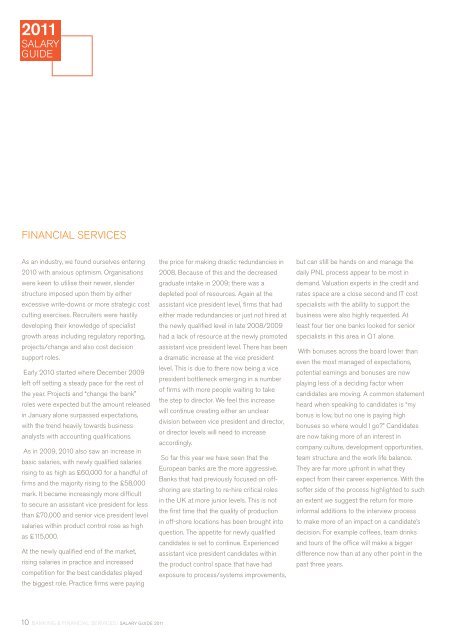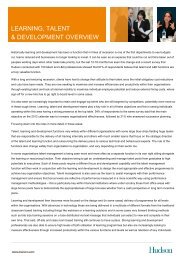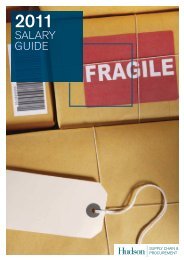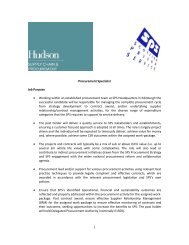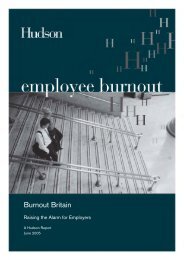Banking & Financial Services Salary Survey - Hudson
Banking & Financial Services Salary Survey - Hudson
Banking & Financial Services Salary Survey - Hudson
Create successful ePaper yourself
Turn your PDF publications into a flip-book with our unique Google optimized e-Paper software.
2011<br />
salary<br />
guide<br />
<strong>Financial</strong> <strong>Services</strong><br />
As an industry, we found ourselves entering<br />
2010 with anxious optimism. Organisations<br />
were keen to utilise their newer, slender<br />
structure imposed upon them by either<br />
excessive write-downs or more strategic cost<br />
cutting exercises. Recruiters were hastily<br />
developing their knowledge of specialist<br />
growth areas including regulatory reporting,<br />
projects/change and also cost decision<br />
support roles.<br />
Early 2010 started where December 2009<br />
left off setting a steady pace for the rest of<br />
the year. Projects and “change the bank”<br />
roles were expected but the amount released<br />
in January alone surpassed expectations,<br />
with the trend heavily towards business<br />
analysts with accounting qualifications.<br />
As in 2009, 2010 also saw an increase in<br />
basic salaries, with newly qualified salaries<br />
rising to as high as £60,000 for a handful of<br />
firms and the majority rising to the £58,000<br />
mark. It became increasingly more difficult<br />
to secure an assistant vice president for less<br />
than £70,000 and senior vice president level<br />
salaries within product control rose as high<br />
as £115,000.<br />
At the newly qualified end of the market,<br />
rising salaries in practice and increased<br />
competition for the best candidates played<br />
the biggest role. Practice firms were paying<br />
the price for making drastic redundancies in<br />
2008. Because of this and the decreased<br />
graduate intake in 2009; there was a<br />
depleted pool of resources. Again at the<br />
assistant vice president level, firms that had<br />
either made redundancies or just not hired at<br />
the newly qualified level in late 2008/2009<br />
had a lack of resource at the newly promoted<br />
assistant vice president level. There has been<br />
a dramatic increase at the vice president<br />
level. This is due to there now being a vice<br />
president bottleneck emerging in a number<br />
of firms with more people waiting to take<br />
the step to director. We feel this increase<br />
will continue creating either an unclear<br />
division between vice president and director,<br />
or director levels will need to increase<br />
accordingly.<br />
So far this year we have seen that the<br />
European banks are the more aggressive.<br />
Banks that had previously focused on offshoring<br />
are starting to re-hire critical roles<br />
in the UK at more junior levels. This is not<br />
the first time that the quality of production<br />
in off-shore locations has been brought into<br />
question. The appetite for newly qualified<br />
candidates is set to continue. Experienced<br />
assistant vice president candidates within<br />
the product control space that have had<br />
exposure to process/systems improvements,<br />
but can still be hands on and manage the<br />
daily PNL process appear to be most in<br />
demand. Valuation experts in the credit and<br />
rates space are a close second and IT cost<br />
specialists with the ability to support the<br />
business were also highly requested. At<br />
least four tier one banks looked for senior<br />
specialists in this area in Q1 alone.<br />
With bonuses across the board lower than<br />
even the most managed of expectations,<br />
potential earnings and bonuses are now<br />
playing less of a deciding factor when<br />
candidates are moving. A common statement<br />
heard when speaking to candidates is “my<br />
bonus is low, but no one is paying high<br />
bonuses so where would I go?” Candidates<br />
are now taking more of an interest in<br />
company culture, development opportunities,<br />
team structure and the work life balance.<br />
They are far more upfront in what they<br />
expect from their career experience. With the<br />
softer side of the process highlighted to such<br />
an extent we suggest the return for more<br />
informal additions to the interview process<br />
to make more of an impact on a candidate’s<br />
decision. For example coffees, team drinks<br />
and tours of the office will make a bigger<br />
difference now than at any other point in the<br />
past three years.<br />
10 <strong>Banking</strong> & <strong>Financial</strong> <strong>Services</strong> | <strong>Salary</strong> Guide 2011


